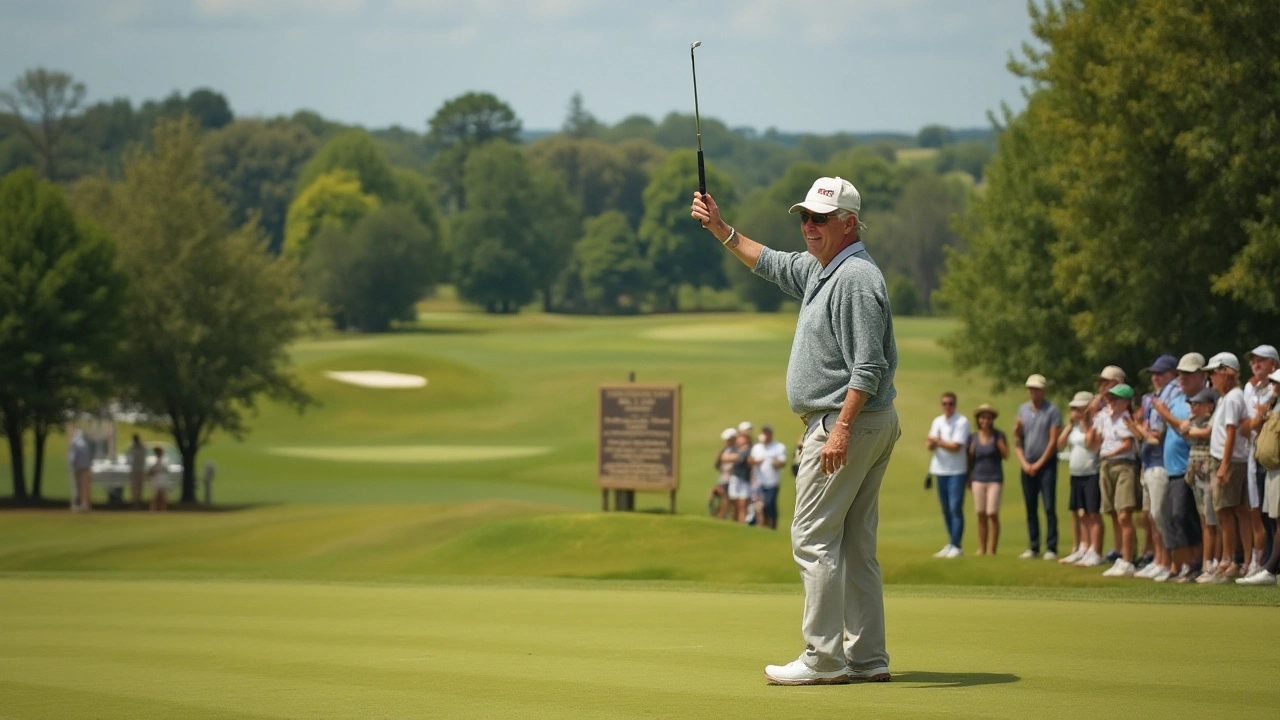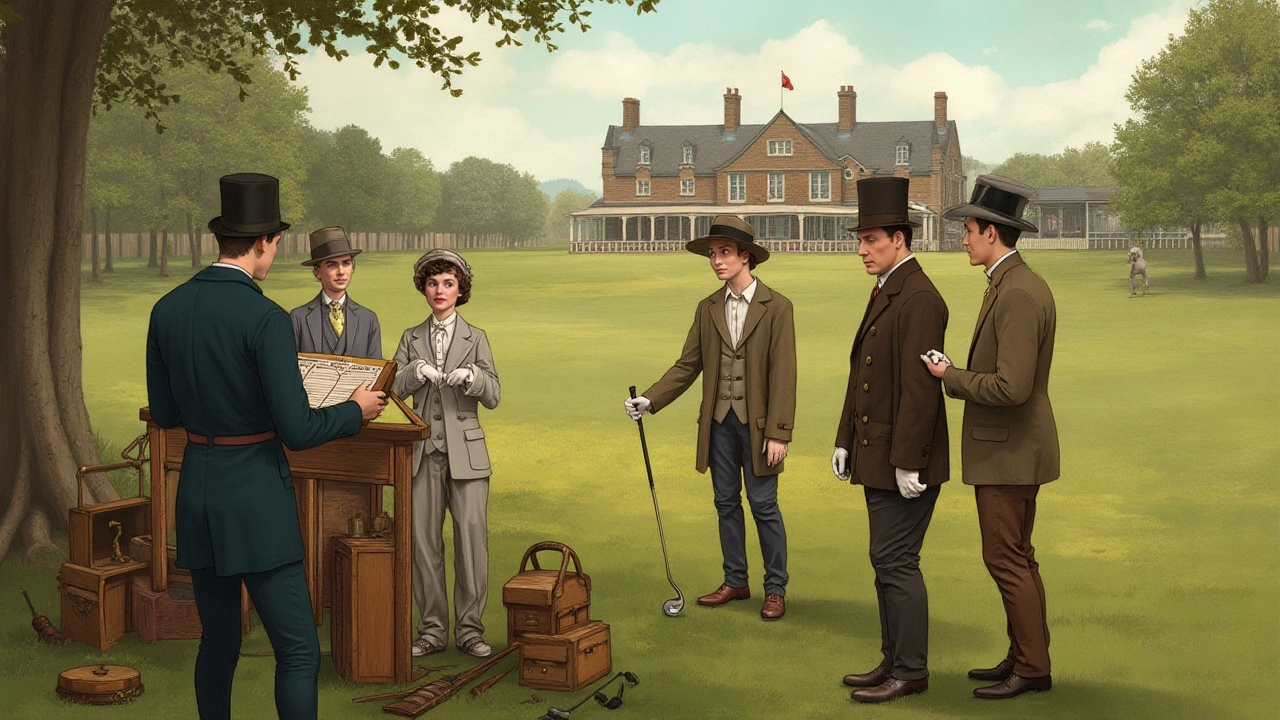
Today, golf enthusiasts around the world frequently talk about scoring a 'birdie', but not everyone knows where this charming term comes from. It carries a rich history that adds an additional layer of intrigue to the game. Many golf terms have fascinating stories, and 'birdie' is no exception.
Let’s embark on a journey to uncover how this odd-sounding word found its way into the world of golf. We'll explore its origin, historical story, and the role it plays in today’s golfing lexicon. By the end of this article, you’ll not only appreciate the scores but also the stories behind them.
- The Origin of 'Birdie'
- The Historical Story
- Meaning and Scoring in Golf
- Influence in Golf Terminology
- Impact on Golf Culture
- Tips for Scoring a Birdie
The Origin of 'Birdie'
Golf is filled with quirky terms that often leave newcomers scratching their heads, but seasoned players know that each term has its unique tale. Among these terms, 'birdie' holds a special place. The story of why it is called a birdie in golf stretches back over a century. It is believed that the term 'birdie' was first used at the Atlantic City Country Club in New Jersey, USA, in the early 1900s. Legend has it that during a casual game between friends, a player hit an outstanding second shot that landed inches from the hole, whereupon one of his companions exclaimed, "That was a bird of a shot!" The group henceforth used 'bird' to refer to a score of one under par, and over time, this evolved into 'birdie'.
This story is not just folklore; it is deeply ingrained in golfing culture, as evidenced by the history of birdie plaques found at the Atlantic City Country Club, commemorating the adoption of this now-famous term in golfing vocabulary. One could say the term flew from there, catching on in popularity quickly as golfers and clubs across America embraced it. And why not? It added a dash of whimsy and life to the sport. In no time, scoring a birdie became something every player aspired to. Aside from enhancing the excitement of a round of golf, the term also added to the colorful language that makes the game so unique. As Henry Longhurst, a renowned golf writer, once said,
"Golf is a game that is played on a five-inch course – the distance between your ears." This epitomizes the mental challenge of golf, to which the language, including terms like 'birdie', contributes significantly.
In contrast to the somewhat solemn terms used in many sports, the word 'birdie' cheerily portrays the spirit of achieving something special and memorable on the course. Thanks to this, it wasn’t long before it found a place in international golfing circles, resonating with players across the globe. Its catchy and light-hearted nature made it easy to spread and stick. One might even argue that a round without a birdie feels incomplete, as it showcases a player's skill and leaves a mark on their scorecard.
The Historical Story
The term ‘birdie in golf’ originated in the United States during the early 20th century, specifically around 1903. It all started at the Atlantic City Country Club in New Jersey. The trigger was an incredible round of play by Ab Smith, a member of the club. As the story goes, Smith hit a remarkable shot that landed just inches from the hole, securing him a stroke under par on that particular hole. Out of a burst of excitement, someone exclaimed that it was a 'bird of a shot', using ‘bird’ as slang for something excellent or outstanding, a common usage in America at that time.
From then on, Smith and his companions started using the term 'birdie' to refer to any score of one under par. The term quickly gained traction and spread like wildfire among golf circles, eventually making its way to the wider golfing lexicon. This charming story exemplifies how local terminology and dynamics can evolve and influence an entire sport's vocabulary globally. It serves as a reminder of the rich social and cultural tapestry that sports like golf develop within.
Time has embedded the term deeply in the heart of golf. By the 1910s, articles in well-known golf magazines referenced scoring a ‘birdie’. Illustrating its place in the game, The New York Times in 1911 acknowledged the terminology, confirming how widely it was embraced by players and journalists alike. Since its creation, the term has never looked back, capturing the playful soul of golf terminology.
One might consider the word's peculiar popularity as a reflection of golf's evolving language. "The vocabulary of golf is enriched by historical anecdotes and local color," said Michael Hurdzan, a celebrated golf course architect.
"The legacy of 'birdie' tells us that golf is much more than just a sport; it is a living, breathing entity that carries stories forward with each swing."This kind of historical resonance endows golf with an understated charm, linking past to present as every player tries to replicate the 'birdie' phenomenon on courses worldwide.

Meaning and Scoring in Golf
The term birdie in golf signifies a score of one stroke under par on a given hole. It is often seen as a triumph for players, both amateur and professional alike. This scoring term adds a sense of accomplishment and carries an encouraging twist of motivation for golfers seeking to improve their game. The concept of par here is essential, as it dictates the expected number of strokes a skilled golfer should take to complete a hole. A birdie, therefore, is not only a measure of skill but also a testament to a player's prowess and precision on the field. As players glide across manicured greens, chasing after that elusive birdie becomes an integral aim of the game.
Scoring a birdie can be a turning point in any game. In fact, it is often the highlight of many rounds, providing a much-needed morale booster. This term, short yet sweet, echoes the satisfaction found in achieving something above average in a sport that demands both strategy and finesse. The elusive birdie remains a golfer’s rewarding secret, their little victory chant in a competitive arena. Enthusiasts often share tales of how birdies have swung tournament outcomes, leaving an air of captivating mystery around this small yet powerful achievement. As the game grows, so does the appreciation of all the nuances, including the excitement that scoring a birdie brings.
"The butterfly counts not months but moments and has time enough." - Rabindranath Tagore. This ethos reflects why golfers treasure each birdie moment as it comes, a reward for the patience and dedication invested in mastering the sport.
A successful birdie requires excellent skill, timing, and often a bit of luck. Golf, with its meticulous attention to detail, teaches resilience and precision, making each birdie a testament to crafted skills honed through hours of practice. Whether it unfolds under the umbrella of a professional competition or a casual weekend match among friends, a birdie is celebrated. For golf instructors, teaching the significance of a birdie reaffirms their role in guiding players to embrace both stability and innovation within their swing techniques. Par, birdie, eagle—all these terms contribute to a rich vocabulary affirming golf’s unique charm.
Consider a scenario where a golfer aims for a birdie on a par-four hole, requiring just three strokes to achieve it. The initial drive must be strong and accurate, ideally landing close enough to make the approach shot manageable. Precision on the green sets up that pivotal putt where focus and calm are crucial. Countless golfers hold their breath, horizon lines blurring as the ball inches closer to the pin, their patience rewarded in those cherished seconds. The beauty of birdie in golf is as much about the journey as it is about the end score, teaching players that even in brief, shining moments, lies the essence of the game.
Influence in Golf Terminology
The term 'birdie', originating from an era when linguistic creativity was rife, has undeniably left a substantial imprint on golf terminology and remains a cherished part of the golfer's lexicon. Tracing back to its roots in the early 20th century, the word 'birdie' arose during a game at the Atlantic City Country Club in New Jersey. A player remarkably scored one under par and exclaimed that this shot was a 'bird of a shot'. Capturing the joy and luck of that moment, his companions embraced the term and it history was made. The golfing community accepted the term with open arms, allowing it to slip into common use, where it has remained ever since. It is remarkable how a simple term, drenched in such spontaneity, has encapsulated the precision and fortune involved in achieving that one below par. The journey from regional slang to global golf vocabulary serves as a testimony to the vibrant cross-cultural interactions within the sport, enhancing both its tradition and player appeal.
As with many sports, golf's terminologies add color and depth to its traditions, enriching the lexicon with unique expressions that gamers globally can trace back to both historical events and popular vernacular. The introduction of 'birdie' into this lexicon has not only etched a mark on the rules but also paved the way for other avian-themed terms such as 'eagle' for two-under par and 'albatross' for three-under. This perpetual avian association seems to hint at a certain whimsy intriguing to both seasoned players and enthusiasts. Its influence reverberated beyond borders, with variants emerging in different cultures and languages, all striving to encapsulate the sheer delight and attainability represented by scoring a birdie. A dynamic weave of intercultural expressions emerges, marking globally shared yet locally nuanced understandings of this beloved term.
Surprisingly, the influence of 'birdie' doesn’t cease just with language. It nudged the inception of many friendly rivalries amongst players, each eager to match or surpass the delight of landing this coveted score. Its delightful connotation turned it into a popular target among golfers, creating a cycle of competition and camaraderie. Players often reminisce about memorable birdies obtained on renowned courses worldwide, associating them with the thrill of iconic victories and personal milestones. With its delicate balance between challenge and satisfaction, the term 'birdie' undeniably energizes aspiring players to polish their techniques, ensuring its place as a catalyst for both sporting growth and camaraderie.
"The charm of golf transcends the mundane, perhaps best embodied in terms like 'birdie' that crystallize the blend of skill and serendipity," noted Golf Digest in a retrospective on the evolution of golf vocabulary.
The fascinating lexicon of golf, sparking joy and inciting curiosity, owes much to these creative insertions like 'birdie'. These terms enrich narratives, enliven conversations around golf courses, and reframe playing experiences. They continually remind players that beyond the technicalities, the game treasures a wondrous spectrum of spontaneity, community spirit, and joy, inviting everyone from novices to pros to partake in the vibrant and shared tapestry of stories of the golf courses around the world. Yet, as much as the history intrigues, it's perhaps the simplicity and zest inherent in 'birdie' that assures its longevity, leaving players consistently eager for those magic moments when skill kisses fortune on the course.

Impact on Golf Culture
Ever since its first utterance on a golf course, the term birdie has enjoyed a special place in the hearts of golfers. Beyond being just a term, it's come to symbolize a small victory in a sport that’s notoriously known for its challenges. Scoring a birdie is a moment of pride and joy, a handy reminder that perfection—even fleeting—is attainable. Golfers, whether novices or seasoned pros, all share a collective cheer when they hear someone calling out 'birdie!'
The simple joy that comes with scoring a birdie in golf demonstrates how deeply intertwined this term is with golfing culture. Clubs worldwide have organized tournaments, where they celebrate birdies, offering extra prizes for players who manage to score often. Communicative nods and smiles pass between players and teams when a birdie drops, forging bonds of shared achievement. This term thus contributes to the camaraderie that is inherent in the game.
Another remarkable aspect is the role of birdies in golfing lingo. Many golf-related words have their roots in golf’s early days, but birdie holds a special charm for its whimsical acknowledgment of success. Kids learning golf get fascinated by words like birdie and eagle. It introduces them to the magic of golf terminology and starts teaching them about goals and strategies.
The late golf champion Bobby Jones once remarked, 'Golf is the closest game to the game we call life. You get bad breaks from good shots; you get good breaks from bad shots – but you have to play the ball where it lies.'This game, filled with its many turns of fate, finds these linguistic embellishments—a birdie reinforcing the positivity and potential for success against odds.
Culturally, the concept of a birdie has seeped into various discourses, symbolic of triumph over brief but meaningful episodes. It can be spotted in casual conversations where a minor win in different spheres of life is what we call a 'birdie moment.' The joy of the golf community reverberates beyond the green into broader culture, which appreciates and acknowledges these little victories. For fans and players, the term weaves an intricate web of heritage, spirit, and the romantic allure of the game.
Tips for Scoring a Birdie
Scoring a birdie is a milestone that many golfers aspire to achieve regularly in their game. Achieving a birdie means you're hitting the ball into the hole in one stroke less than the expected par for a given hole. Here are some tips to help you increase your chances of scoring a birdie on the golf course.
First and foremost, understanding the layout of the golf course you’re playing on is crucial. Familiarity with each hole’s design, obstacles, and trap placements can significantly boost your strategic planning. Before you even take your first swing, spend time studying the course map and visualizing each hole. This mental preparation helps you anticipate challenges and identify opportunities for birdie chances. Consider the weather conditions, as well; knowing if you’re facing a headwind or tailwind can influence your club choice and swing speed.
Secondly, mastering your approach shots is vital. An approach shot sets the stage for a closer putt, which could lead to a birdie. Practice dialing in on distances between fifty to a hundred yards, though it may vary depending on your strengths. Precision is the key here. Developing a reliable short game allows you to get the ball on the green with fewer strokes. As Ben Hogan famously said, "The most important shot in golf is the next one." He emphasizes that every shot builds the momentum toward achieving a lower score.
Taking advantage of the right equipment also plays a role. Ensuring that the golf vocabulary includes understanding when to deploy specific clubs can be the deciding factor in a successful birdie attempt. Many pros carry specialized wedges for various approach shots. Customizing your arsenal based on personal strengths and weaknesses helps streamline performance. You should feel comfortable with the clubs you have in your bag; thus, regular practice with each improves your response on the field. Consider upgrading equipment if it consistently underperforms, but always make sure it aligns with your needs; sometimes minor changes can yield big results.
Polishing your putting skills is another critical factor. Many golfers find themselves missing out on a birdie due to missed putts. Practicing the art of reading greens accurately can considerably increase your birdie chances. Consider setting aside practice time solely dedicated to putting, experimenting with grip styles, and even studying professional players’ techniques. Remember, the ideal putt may not always require maximum force but rather a measured gentle touch, emphasizing control over power.
Lastly, patience and mental fortitude go hand in hand when chasing that coveted birdie. Golf is as much a mental game as it is physical. Embrace challenges, learn from mistakes, and never lose sight of securing incremental improvements. Sometimes, opportunities for a birdie present themselves unexpectedly, requiring you to adapt quickly and confidently. Keeping a calm mind focused on each shot, along with a positive attitude, often distinguishes successful players. As a friendly reminder, a birdie in golf may sometimes elude you, but every experience on the course offers lessons that inch you closer to your goals.
